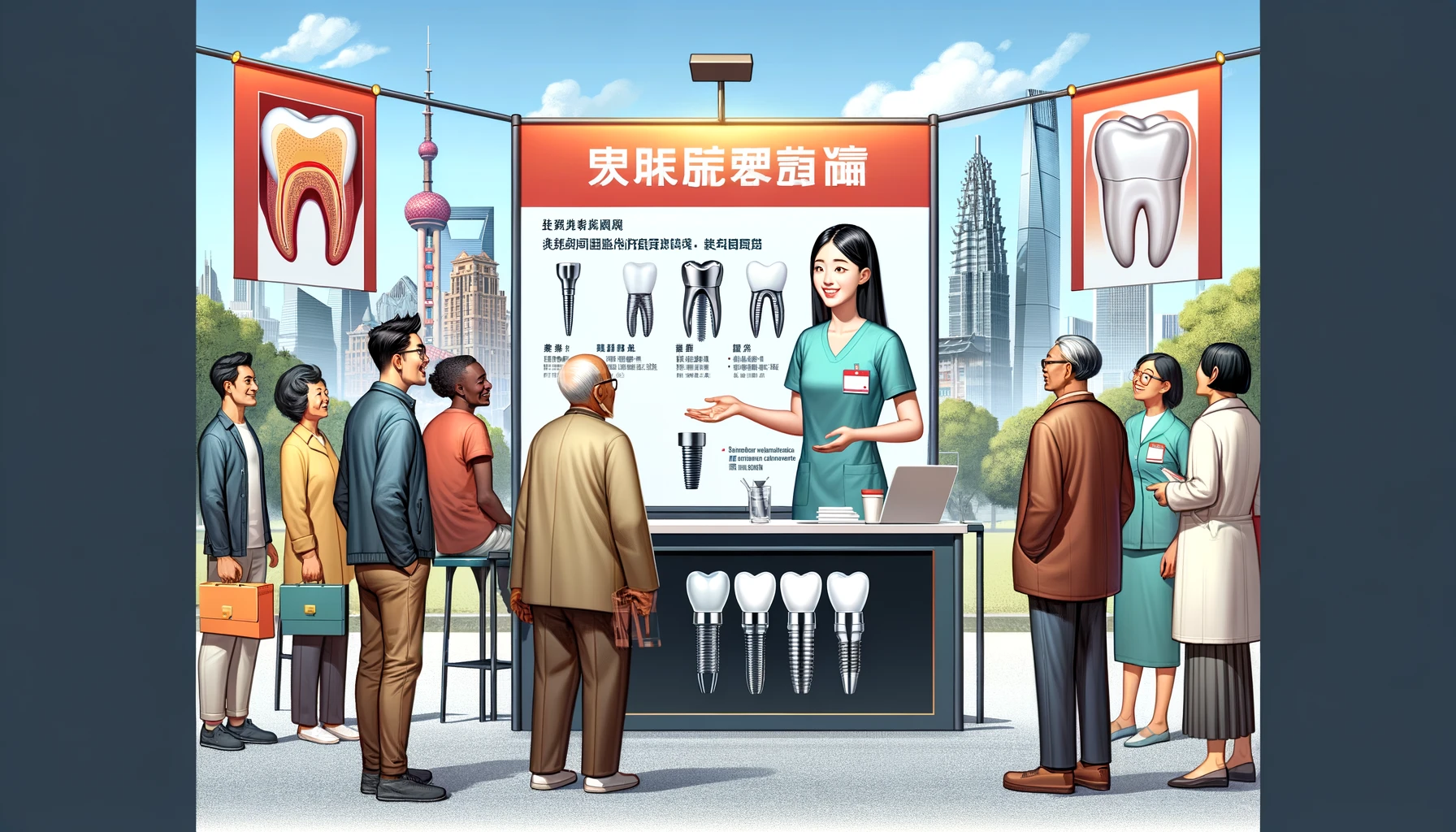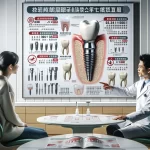China has rapidly become a top destination for dental tourism, attracting patients from around the globe with its state-of-the-art facilities and affordable prices. Did you know that dental procedures in China can cost up to 70% less than in countries like the United States? If you’re considering dental implants, you’re not alone in seeking high-quality care at a fraction of the price.
In this guide, you’ll uncover essential insights into the best clinics, innovative techniques, and what to expect regarding costs. We promise to equip you with the knowledge you need to make informed choices about your dental health.
Are you ready to transform your smile without breaking the bank? Let’s dive into everything you need to know about securing top dental implants in China!
Understanding Dental Implants: A Comprehensive Guide
Dental implants are artificial tooth roots surgically placed into the jawbone to support replacement teeth. These titanium posts fuse with the bone through osseointegration, creating a stable foundation for new teeth . A dental implant consists of three parts: the implant body (inserted into the bone), the abutment (connects the implant to the crown), and the crown (the visible part that resembles a natural tooth) .
How Dental Implants Work
The process involves several key steps:
- Evaluation: A dentist assesses your oral health and jawbone density.
- Implant Placement: The titanium post is surgically inserted into the jawbone.
- Osseointegration: The implant fuses with the bone over 3-6 months .
- Abutment Attachment: A connector is placed on the implant.
- Crown Placement: A custom-made artificial tooth is attached to the abutment.
Benefits of Choosing Dental Implants
Dental implants offer many advantages over traditional tooth replacement options:
- Preserve Jawbone Density: Implants stimulate bone growth, preventing deterioration.
- Function Independently: Unlike bridges, implants don’t rely on adjacent teeth for support.
- Natural Appearance: They closely resemble natural teeth in look and feel.
- Restore Full Chewing Power: Implants allow normal biting and chewing functions.
- Long-Term Solution: With proper care, implants can last a lifetime.
- Improve Oral Health: They don’t require altering healthy teeth, as with bridges.
Advancements in Dental Implant Technology
Recent innovations have significantly improved dental implant procedures, offering more precision and better outcomes:
- 3D Imaging and Digital Planning: Advanced 3D imaging and planning software enable precise visualization of jawbone structure, allowing dentists to plan and execute implant placement with unprecedented accuracy. This technology has reduced procedure times and improved outcomes.
- Minimally Invasive Techniques: Keyhole surgery and other minimally invasive approaches have made implant procedures more accessible. These techniques reduce recovery time and minimize complications, benefiting a broader range of patients.
- Biocompatible Materials: The use of zirconia alongside traditional titanium offers improved biocompatibility and aesthetic outcomes. These materials enhance implant integration with surrounding tissues and reduce allergic reaction risks.
Dental Implants vs. Other Tooth Replacement Options
| Feature | Dental Implants | Bridges | Dentures |
|---|---|---|---|
| Longevity | 25+ years | 5-15 years | 5-8 years |
| Bone Preservation | Yes | No | No |
| Natural Look and Feel | High | Moderate | Low |
| Maintenance | Easy | Moderate | High |
| Impact on Adjacent Teeth | None | High | None |
The Dental Implant Procedure: What to Expect
- Initial Consultation: Your dentist will evaluate your oral health, take X-rays, and discuss your options .
- Treatment Planning: A customized plan is created based on your specific needs and jawbone condition .
- Implant Placement: The titanium post is surgically inserted into your jawbone under local anesthesia .
- Healing Period: Over 3-6 months, the implant fuses with your bone through osseointegration .
- Abutment Placement: Once healed, a small connector post (abutment) is attached to the implant.
- Crown Attachment: Finally, a custom-made crown is secured to the abutment, completing your new tooth.
Caring for Your Dental Implants
Proper maintenance ensures the longevity of your dental implants:
- Brush twice daily with a soft-bristled toothbrush.
- Floss daily, using implant-specific floss or water flossers.
- Rinse with an antimicrobial mouthwash.
- Attend regular dental check-ups and professional cleanings.
- Avoid smoking and limit alcohol consumption.
Cost Considerations for Dental Implants
Cost is a significant factor for many patients considering dental implants. The expenses can vary widely depending on the complexity of the case, the materials used, and the location of the dental practice. Some patients explore options in other countries to reduce expenses.
| Procedure | China (USD) | United States (USD) |
|---|---|---|
| Single Implant | $800 – $1,200 | $3,000 – $6,000 |
| Full Mouth Restoration | $6,000 – $10,000 | $30,000 – $90,000 |
| Bone Grafting | $500 – $1,500 | $2,000 – $3,000 |
| Sinus Lift | $800 – $1,200 | $1,500 – $3,000 |
Prices are estimates and may vary based on specific clinics and case complexity. Many clinics also offer bundled packages that include comprehensive treatment options along with financing plans to make procedures more accessible.
Top Destinations for Dental Implants in China
China has become a popular choice for dental implants, offering high-quality care at competitive prices. The Chinese dental implant market is rapidly expanding, with projections estimating a compound annual growth rate (CAGR) of 6.94% from 2022 to 2027, potentially reaching USD 200.39 million by 2027. This surge is fueled by technological advancements, increased awareness of oral health, and the rising trend of medical tourism .
Beijing: The Capital of Dental Excellence
As China’s capital, Beijing is a leading destination for dental implant procedures, featuring world-class facilities and internationally trained professionals.
Peking University School and Hospital of Stomatology: This institution is renowned for its advanced dental implant technology, employing expert implantologists and premium Straumann implants. Patients can expect:
- State-of-the-art facilities
- Experienced professionals with international training
- Advanced implant materials like titanium and zirconium oxide
Beijing United Family Hospital Dental Clinic: With over two decades of experience, this clinic adheres to strict international guidelines and American dental hygiene standards. They offer:
- Comprehensive dental care, including advanced implant dentistry
- Cutting-edge technology such as Cone Beam CT and digital surgical guides
- English-speaking staff, catering to international patients
Shanghai: The Pearl of Dental Innovation
Known for its modernity, Shanghai is another prime location for dental implants in China.
ParkwayHealth Dental Centres: Located in the Shanghai Centre Medical & Dental Centers, ParkwayHealth is a popular choice among expatriates and locals, offering:
- Dental implant services from internationally qualified medical staff
- Comprehensive care in a convenient location
- Partnerships with leading implant brands like Straumann
Shanghai Jiahui International Hospital: This hospital provides a wide array of dental services, including implants, in a modern setting, where patients can expect:
- Attentive care in state-of-the-art facilities
- A team of experienced dental professionals
- Advanced implant technologies and materials
Guangzhou: Southern China’s Dental Hub
Guangzhou, a major city in southern China, presents excellent options for dental implant procedures.
Guangzhou United Family Hospital: As part of the United Family Healthcare network, this hospital provides high-quality dental implant services. They feature:
- Advanced technology and adherence to international standards of care
- A wide range of dental treatments complementing implant procedures
- Multilingual staff to assist international patients
Willis International Medical Clinic: This multi-specialty hospital in Guangzhou offers leading-edge diagnostic and therapeutic services, including dental implants. Highlights include:
- A one-stop clinical center in the heart of Guangzhou
- State-of-the-art dental implant technologies
- Experienced implantologists and support staff
Considerations for Dental Implants in China
When considering dental implant treatment in China, keep these factors in mind:
- Cost-Effectiveness: Savings of 50-75% compared to Western countries are possible .
- Quality of Care: Many clinics use advanced materials like zirconia and titanium alloys, ensuring high-quality implants.
- Technology: Chinese dental facilities often feature state-of-the-art equipment and follow international standards .
- Language Considerations: Confirm language options before booking, although many clinics offer English-speaking staff.
- Travel and Follow-up: Account for travel expenses and potential follow-up care needs.
Future Outlook
The dental implants market in China is poised for continued expansion. The introduction of volume-based procurement (VBP) has significantly increased dental implant procedures by making treatment more affordable and accessible . By 2030, China may account for approximately 60% of dental implant sales in the Asia Pacific region .
As the market evolves, patients can anticipate:
- Further advancements in implant technology
- Increased competition leading to better pricing
- Continued improvement in the quality of care and patient experience
For individuals considering dental implants, China offers a combination of affordability, quality, and advanced technology . Thoroughly research clinics, verify credentials, and plan for comprehensive care to ensure optimal outcomes . Xhaowen is committed to keeping you updated on the latest advancements in oral health and hygiene, ensuring you’re well-informed about your dental care options.
The Dental Implant Process
Dental implants are now a common and effective solution for replacing missing teeth, offering a restoration that looks and feels natural . It involves several carefully planned stages, from the initial consultation to the final crown placement, each designed to ensure a successful and lasting result . Getting a dental implant isn’t a quick fix; it’s a detailed process tailored to give you a strong and functional new tooth. The typical implant process in China spans several months to allow proper healing and osseointegration.
Initial Consultation and Planning
The journey begins with a comprehensive consultation with your dentist or oral surgeon . This initial visit involves a thorough examination of your oral health, including X-rays and 3D imaging, to determine if your jawbone is healthy enough to support an implant . Your dentist will also review your medical history and discuss your goals to create a tailored treatment strategy . This thorough assessment helps determine the best course of action for your specific needs. In some instances, extra bone might be needed in the jaw to make implants possible via a bone graft, especially if bone has been lost over time or due to infection .
Surgical Implant Placement
Once you’re cleared for surgery, the implant placement is scheduled. In China, dental implant surgery is typically performed by oral and maxillofacial surgeons who specialize in treating diseases, injuries, and defects in the mouth and face. During this minor surgical procedure, a titanium post, serving as the tooth root, is carefully inserted into the jawbone . Local anesthesia or sedation ensures your comfort throughout the procedure . Following the placement, a healing period of 3-6 months is essential.
Healing and Osseointegration
After the titanium implant is placed, your jawbone needs time to heal and strengthen. Osseointegration begins, a process where the bone grows around and fuses with the implant . This natural fusion creates a stable anchor for the artificial tooth, similar to how roots support natural teeth . This process typically takes several months .
Abutment Placement and Final Restoration
Once osseointegration is complete, the next step involves attaching an abutment to the implant post . This small connector will hold the future crown in place. In some instances, a temporary crown may be placed to maintain aesthetics while the gums heal. The final stage involves placing the permanent, custom-made crown . This prosthetic is designed to match the color, size, and shape of your natural teeth, providing a seamless appearance and restoring full functionality to your bite. Your dentist will ensure a perfect fit.
Aftercare and Maintenance
Following the final restoration, proper aftercare and maintenance are crucial for the long-term success of your dental implant . This includes regular brushing and flossing, as well as routine check-ups with your dentist to ensure the implant remains healthy and functional. Maintaining good oral hygiene helps prevent infections and ensures the longevity of the implant .
Factors Affecting Candidacy
While dental implants are a viable solution for many, not everyone is an ideal candidate. Factors affecting candidacy include :
- Age: The jawbone must be fully developed.
- Bone Density: Sufficient bone density is needed to support the implant. Bone grafting may be necessary if there is significant bone loss.
- Oral Health: Healthy gums and the absence of infections are essential.
- Lifestyle Choices: Smoking and tobacco use can hinder healing and decrease the chances of a successful implant .
- Medical Conditions: Certain medical conditions can limit bone healing.
Types of Dental Implants
Patients have various dental implant options, depending on their needs :
- Single Tooth Implant: Replacing a single missing tooth.
- Implant-Supported Bridge: Replacing multiple missing teeth, supported by two or more implants.
- All-on-X Dental Implants: A full set of dentures supported by multiple implants, ideal for patients missing all their teeth.
- 3-on-6 Dental Implants: An alternative to full dentures, consisting of six implants supporting three bridges.
Potential Problems and How to Avoid Them
While dental implant surgery has a high success rate, potential problems can occur . Complications can include infections, nerve damage, and implant failure. To minimize these risks, choosing an experienced oral surgeon and following all aftercare instructions are essential. Regular dental visits and maintaining excellent oral hygiene are also crucial for preventing complications and ensuring the long-term success of your dental implant.
Cost and Financing Options
The cost of dental implants can vary, depending on the number of implants needed, the type of restoration, and any additional procedures such as bone grafting . Many dental practices offer financing options to make dental implants more accessible.
Why Choose Xhaowen?
At Xhaowen, we’re committed to providing you with the latest information regarding oral health and hygiene. Our blog section features a variety of articles on dental care, offering insights and tips to help you maintain a healthy and confident smile. We understand that considering dental implants is a significant decision, and we’re here to support you with reliable and up-to-date information.
| Stage | Description | Duration |
|---|---|---|
| Initial Consultation | Examination, X-rays, and treatment planning | 1-2 appointments |
| Implant Placement | Surgical insertion of the titanium post | 1-2 hours per implant |
| Osseointegration | Healing period for the bone to fuse with the implant | 3-6 months |
| Abutment Placement | Attachment of the connector piece | 30-60 minutes |
| Crown Placement | Fitting and placement of the custom-made artificial tooth | 1-2 appointments |
| Regular Check-ups | Ongoing maintenance and monitoring | Varies, every 6-12 months |
Conclusion
China’s rise as a top destination for dental implants is driven by exceptional quality, advanced technologies, and attractive prices. With potential savings of 50-75% compared to the US, seeking treatment at one of China’s leading dental hospitals can be a wise choice.
By carefully selecting a reputable clinic, opting for premium implant systems, and adhering to proper post-treatment care guidelines, you can achieve a transformed smile that lasts a lifetime. This guide equips you with key information to make an informed decision as you embark on your journey toward a new smile in China.
Modern dental implants in China utilize advanced materials like zirconia and new titanium alloys for improved strength, durability, and biocompatibility.
3D printing allows for highly customized implants tailored to individual needs, ensuring a better fit and more natural appearance.
The cost varies, but basic titanium implants typically range from $1,000 to $2,500, while premium ceramic implants can cost between $2,500 and $4,000.
Yes, there is a growing preference for minimally invasive techniques that reduce recovery time and discomfort.
Important factors include the provider’s certification, experience, understanding of the procedure, quality of materials used, and transparent costing.







